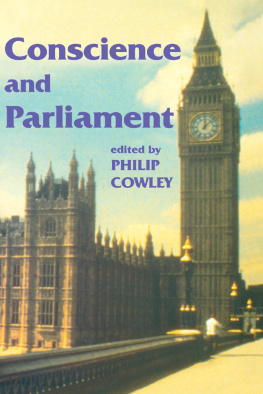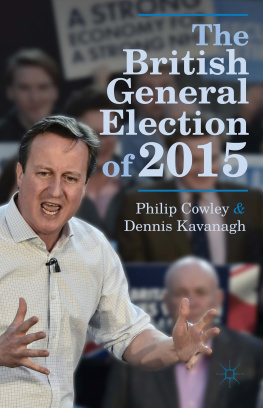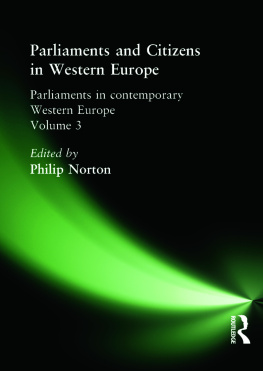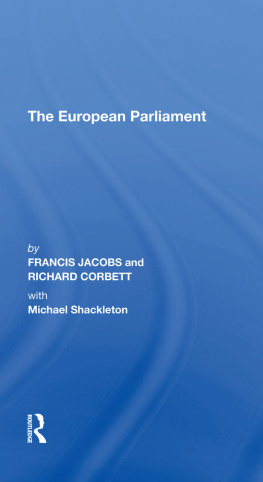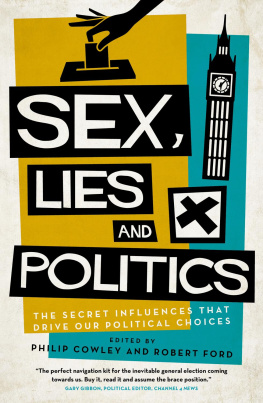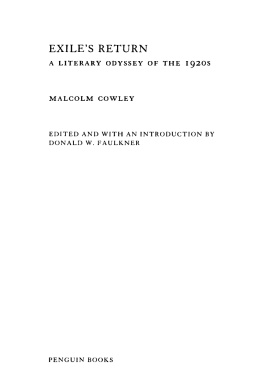First published in 1998 in Great Britain
by Routledge
2 Park Square, Milton Park, Abingdon, Oxon, OX14 4RN
270 Madison Ave, New York NY 10016
Transferred to Digital Printing 2007
Website: http://www.routledge.com
Copyright 1998 Routledge.
British Library Cataloguing in Publication Data
Conscience and Parliament
1. Conscience 2. Legislative bodies Great Britain
3. Legislative bodies Great Britain Moral and ethical aspects
328.41
ISBN 0 7146 4836 1 (cloth)
ISBN 0 7146 4388 2 (paper)
ISSN 1460-9649
Library of Congress Cataloging-in-Publication Data
Conscience and Parliament / edited by Philip Cowley
p. cm. (The library of legislative studies)
Includes index.
ISBN 0-7146-4836-1 (cloth) ISBN 0-7146-4388-2 (paper)
1. Great Britain Social policy 1979-2. Social values
Great Britain 3. Great Britain. Parliament. I. Cowley,
Philip. II. Series.
HN383.5.C65 1998
361.6T0941-dc21
All rights reserved. No part of this publication may be reproduced, stored in or introduced into a retrieval system, or transmitted in any form, or by any means, electronic, mechanical, photocopying, recording or otherwise without the prior permission of the publisher of this book
Publisher's Note
The publisher has gone to great lengths to ensure the quality of this reprint but points out that some imperfections in the original may be apparent
Contents
Charles Pattie, Ron Johnston
and Mark Stuart |
Notes on Contributors
Matthew Bailey is a postgraduate student in the Department of Politics at the University of York.
Philip Cowley is a Lecturer in Politics at the University of Hull.
Martin Durham is Senior Lecturer in Politics at the University of Wolverhampton.
Gabriele Ganz is Emeritus Professor of Law at the University of Southampton.
Robert Garner is a Lecturer in Politics at the University of Leicester.
Ron Johnston is Professor of Geography at the University of Bristol.
David Marsh is Professor of Politics at the University of Birmingham.
Susan Millns is a Lecturer in Law at the University of Kent at Canterbury.
Charles Pattie is Senior Lecturer in Geography at the University of Sheffield.
Melvyn Read is a Lecturer in Politics at the Queen's University of Belfast.
Sally Sheldon is a Lecturer in Law at the University of Keele.
Kevin Shinkwin is the Parliamentary Officer of the Limbless Association and the Muscular Dystrophy Group. He is also a member of the National Disability Council.
Mark Stuart is a researcher at the University of Lancaster and is completing Douglas Hurd's authorised biography.
Introduction
PHILIP COWLEY
A N ANNOYING feature of far too many books about politics is that the author spends a substantial part of the book taking a phrase which everyone thought they understood and analysing its definition from every possible angle; after much examination there follows a metaphorical shrugging of the shoulders, and the resigned conclusion that the world is, after all, a pretty complicated place. Hannah Pitkin's The Concept of Representation, for example, consists of almost 250 densely argued pages, at the end of which most people still will not know what we mean by representation. It would be a pleasant surprise if this book could be different. It is, however, (unfortunately) just not possible to discuss conscience issues without some setting of the terms of reference. What do we mean by conscience issues? And how do these issues differ from other political issues?
Broadly speaking, conscience refers to the sense of right and wrong that governs a person's thoughts and actions. This clearly does not help us much. After all, we would hope that all politics is conscience politics, in that we would hope that all politicians do things that they think are right and eschew those they know to be wrong. (Even if we doubt this believing that our politicians often do things they know are wrong and eschew those they think to be right it is unlikely that they only do this when dealing with one particular type of issue). Nor is moral as in moral issues, a phrase frequently used as a synonym for conscience issues much better. Moral issues are those concerned with or relating to human behaviour, esp. the distinction between good and bad or right and wrong behaviour. Yet whilst such issues do exist, there are relatively few which are purely strategic or technical. As a result, defined in these terms, it becomes almost meaningless to talk of conscience or moral issues as a sub-set of political issues; the definition is too broad, encompassing almost all areas of policy. Such a definition would, for example, include defence and foreign policy: there can presumably be few decisions involving one's conscience more than deciding whether to send soldiers out to fight, knowing that some or all may be killed. It would also include economic policy, for whilst some economic decisions may be simply strategic or technical, many others involve moral decisions of some sort. Is it moral for a polity to have high levels of unemployment? Is it moral to have high levels of inflation, which can savagely reduce the value of people's savings? Is it moral to have high levels of taxation, seen by some as state-sponsored theft? Issues of crime and punishment similarly involve moral decisions by the bucket-load, not least in the treatment of those we punish.
Yet politicians and journalists regularly describe a policy as an issue of conscience and/or a moral issue, and they have something more definite in mind. Issues usually referred to as issues of conscience include corporal and capital punishment, abortion and embryo research, hunting, contraception, the punishment of war criminals, Sunday entertainment and trading, homosexuality, prostitution, euthanasia, censorship, divorce, and, less definitely, disability rights and the wearing of seatbelts.
One approach is to define conscience issues not by reference to the conscience of the parliamentarian but by reference to the
Despite the common usage of the phrases in political discussion, then, it is impossible to define clearly what we mean by an issue of conscience or a moral issue. As a result, it is possible to argue as Peter Jones has done most eloquently that we should cease to see some issues as different from others on the grounds that only some raise issues of conscience. Yet whatever should be, there are at present issues within British politics which are seen as special because of their supposed moral nature. The phrases issue of conscience and moral issues are a frequently used, convenient, but essentially misleading shorthand for these issues. It is easier to list them than to define what links them, although they tend to be social questions which have strong moral overtones, in the words of Peter Richards,
These issues certainly matter to people. Whether the death penalty should be restored; whether abortion should be legal He concentrated on halfa-dozen case studies: capital punishment; homosexuality; abortion; theatre censorship; divorce; and Sunday entertainment. All had been the subject of significant campaigns in the immediately preceding years. With one exception the campaign to make forms of Sunday entertainment legal all the campaigns had resulted in legislative change: capital punishment was abolished (at least de facto) in Great Britain; male homosexuality was legalised in England and Wales; and the laws relating to censorship, divorce and abortion were all liberalised. All these changes occurred in a very short period of time, the four years between 1965 and 1969.

